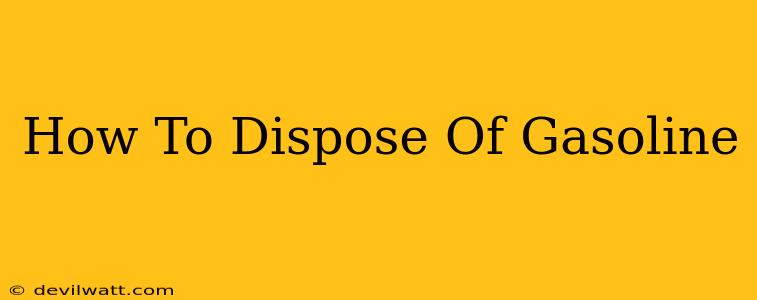Gasoline is a highly flammable and hazardous material. Improper disposal can lead to serious environmental damage, health risks, and even legal repercussions. This guide provides a comprehensive overview of safe and legal gasoline disposal methods. Understanding the risks and following proper procedures is crucial.
Why Proper Gasoline Disposal is Essential
Gasoline, a volatile organic compound (VOC), contributes to air pollution when improperly disposed of. It can contaminate soil and groundwater, harming ecosystems and potentially entering our drinking water supplies. Furthermore, gasoline spills pose a significant fire hazard. Ignoring proper disposal protocols isn't just irresponsible; it's potentially illegal.
Environmental Impact
The environmental consequences of improper gasoline disposal are far-reaching. Gasoline can leach into the soil, contaminating the groundwater and harming plant and animal life. The volatile nature of gasoline also means it readily evaporates into the atmosphere, contributing to smog and air pollution. This contributes to climate change and respiratory problems.
Health Risks
Exposure to gasoline fumes can cause various health problems, including headaches, dizziness, nausea, and respiratory irritation. Long-term exposure can lead to more serious health issues. Direct skin contact should be avoided at all costs. Improper disposal puts yourself and others at risk.
Legal Ramifications
Many jurisdictions have strict regulations governing the disposal of hazardous materials like gasoline. Improper disposal can lead to hefty fines and even criminal charges. Always check with your local authorities for specific regulations in your area.
Safe and Legal Gasoline Disposal Methods
The best way to dispose of gasoline is to prevent it from becoming waste in the first place. Properly maintain your vehicles and equipment to minimize spills and leaks. However, if you do have gasoline to dispose of, here are some recommended options:
1. Use It Up
The most environmentally friendly method is to simply use up the gasoline. This could involve using it in your vehicle, lawnmower, or other gasoline-powered equipment.
2. Take it to a Recycling Center or Hazardous Waste Facility
Many communities have designated recycling centers or hazardous waste facilities that accept gasoline. These facilities are equipped to handle hazardous materials safely and environmentally responsibly. Contact your local waste management authority to locate the nearest facility and confirm their acceptance procedures.
3. Contact a Licensed Hazardous Waste Removal Company
For larger quantities of gasoline or if you're unsure about other disposal methods, consider contacting a licensed hazardous waste removal company. These companies have the expertise and equipment to handle gasoline disposal safely and in compliance with all regulations. Obtain multiple quotes and verify their licensing before making a decision.
What NOT to Do:
- Pour gasoline down the drain or into the ground: This contaminates water sources and poses a significant environmental and health risk.
- Burn gasoline: Burning gasoline releases harmful pollutants into the atmosphere.
- Throw gasoline in the trash: Gasoline containers are considered hazardous waste and should not be disposed of in regular trash.
Preventing Gasoline Waste: Best Practices
Proactive measures are key to minimizing gasoline waste. Here are some tips:
- Regular vehicle maintenance: Keep your car in good working order to prevent leaks and spills.
- Proper fuel storage: Store gasoline in properly sealed, approved containers in a cool, well-ventilated area.
- Accurate fuel measurement: Avoid overfilling your gas tank to prevent spills.
By understanding the risks associated with improper gasoline disposal and following the safe and legal methods outlined above, you can protect the environment, safeguard your health, and comply with local regulations. Remember, responsible disposal is crucial for a healthier planet and community.

